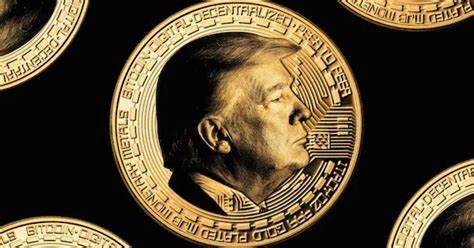Should denationalized or private currencies replace state-backed fiat currencies?
- Alex Ugoh
- Jan 22
- 3 min read
Updated: Apr 11

As 2025 starts to find its stride, the international community will begin contending with a different set of challenges and obstacles. One of the most anticipated headlines has finally arrived, with a new administration taking center stage in the West. On 20th January, Donald Trump was inaugurated as the United States of America's 47th president. Interestingly, one of the top priorities for the Trump administration includes advocating for the cryptocurrency industry. Several analysts are making suggestions that making crypto a national priority could legitimately be amongst the plethora of executive orders that Trump issues in the White House. In market terms, Trump became one of the world's richest men with the launch of his self-named meme coin "$TRUMP"; depending on the valuation used, this cryptocurrency has an implied market cap of either $47 billion or $9 billion.
So it begs the hypothetical question, with the global economy facing continued stressors, should denationalized or private currencies replace state backed fiat currencies?
Before we dive right in, let's first understand some key differences:
Fiat currencies, such as the dollar or the euro, are government-issued and regulated, serving as legal tender for transactions within a country’s borders. Their value is derived from the trust and authority of the issuing government and can be shaped by monetary policies set by central banks.
In contrast, cryptocurrency operates on decentralized networks, primarily using blockchain technology and hence enabling peer-to-peer transactions without the need for intermediaries such as banks. This decentralization ultimately shifts control away from centralized authorities to the direct users.
Reasons against cryptocurrencies replacing state backed fiat currencies
1) Susceptibility to tampering and attacks across all levels
Cryptocurrencies can fall victim to attacks against the mining pool because of the different reward mechanisms that are embedded within the blockchain (Pool-hopping & Block-withholding to name a few)
2) Promotes a "do whatever it takes to win" framework
Cryptocurrencies cater for money laundering services because of the normalized "mixing of wallets", whereby a user's coins are transferred through a network of microtransactions, thus limiting traceability
Incentivizes tax-evasion due to earnings on coins not being taxable
3) Ethical dark markets
Cryptocurrency was being used to purchase goods from Silk Road before it was shut down by US authorities, where 86.14% of customers purchased drugs, pharmaceuticals, and seeds, followed by 6.93% buying video games, and 6.93% buying stolen accounts
Cryptocurrencies imply that the rules of the game are simply not the same across the board and so it runs the risk of educating younger audiences that they should be using their innate talents and gifts for ill-intent
Reasons for cryptocurrencies replacing state backed fiat currencies
1) Superiority of the blockchain technology
All valid transactions are recorded into a block, this in turn incorporates a reference into the previous block thus protecting the chain from being tampered with
Any attempt to distort the order or content of the past transaction inflicts a self-enforcing discontinuity in the blockchain
2) The Global South
A decentralized currency may enable developing countries to leverage their emerging markets and unlock the untapped potential of their industries
For example, Brazil has introduced cryptocurrency ETFs, promoting saving incentives as well as improvements in capital flows (which can help support microfinancing services)
Some cryptocurrencies complement those who want to solve real world problems
For example, the cryptocurrency labelled ‘VeChain’ revolves around supply-chain projects, ensuring that there is an authenticity and quality of goods sold through offering verification services

Comments